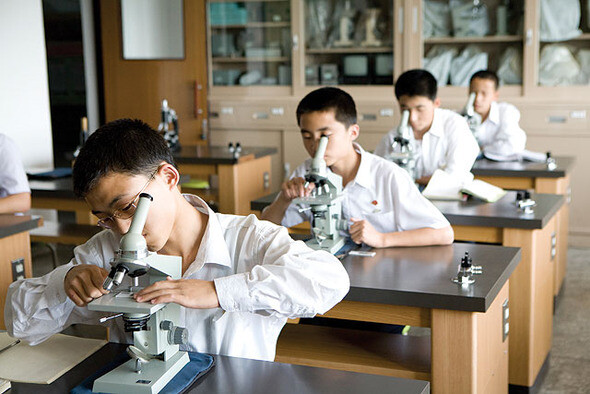hankyoreh
Links to other country sites 다른 나라 사이트 링크
Even in North Korea, parents open their wallets for private education

Even in North Korea’s socialist system, which provides 12 years of free public schooling up until university, parents are reportedly eager to get their children tutoring in school subjects such as math and Korean.
According to a report that appeared in the June issue of North Korean Economic Review, published by the Korea Development Institute (KDI), educational opportunity is affected by parents’ economic standing even inside North Korea‘s theoretically equal system of education. The report was written by Kim Jeong-won, a senior analyst with the Korean Educational Development Institute (KEDI).
Not only is there a current fad for group tutoring sessions in school subjects such as math and Korean, but it is also common for parents to bribe teachers to help their children qualify for the university entrance exam, the report claims.
North Korea’s version of competition for the university entrance exam starts in kindergarten. Since mastering some kind of artistic activity - playing a musical instrument or dancing, for example - is essential to enter the North Korean upper class, students strive to get their children into kindergartens that specialize in art education.
Competition over the school curriculum intensifies after students proceed to elementary school. Parents push their children to excel in important subjects like math and Korean so that they can be admitted to each province’s single boarding school, called the “first middle school.”
Students at first middle schools receive a large number of privileges. They are exempted from various forms of labor, which gives them an advantage in preparing for university admission, and they are also allowed to choose when to enter the military.
“Parents are more interested in Korean and math education than in ideological education. The gap in educational opportunities occurs because parents who can afford it actively arrange for their children to be tutored,” Kim wrote in the paper.
In the paper, Kim cites examples of parents pooling their resources to provide the tutor with a house in exchange for the tutor giving their children group lessons in math and other subjects.
After students have entered middle school, which is equivalent to South Korea’s high school, the next hurdle is the university entrance exam. First middle schools admit students on a selective basis, just like South Korea’s special-purpose high schools, and they focus on the university entrance exam, which is based on the public school curriculum.
Ordinary middle schools reportedly divide students into a university track and a non-university track. Students in the non-university track commonly join the military immediately after graduation. Parents frequently bribe teachers to place their children on the university track and to recommend them for university admission, Kim wrote in the report.
In North Korea, Kim explains, a university diploma is an essential qualification for getting a job as a professional and for becoming a party cadre.
“In North Korean society, the party and organizations no longer serve as a safety net to protect individuals, and concerned people feel that they must have the strength to protect themselves. This concern is being expressed in the desire for university admission,” Kim said.
“The growing power of money [in North Korean society] is neutralizing the public school system and creating a market for education.”
By Noh Hyun-woong, staff reporter
Please direct questions or comments to [english@hani.co.kr]

Editorial・opinion
![[Column] Season 2 of special prosecutor probe may be coming to Korea soon [Column] Season 2 of special prosecutor probe may be coming to Korea soon](https://flexible.img.hani.co.kr/flexible/normal/500/300/imgdb/original/2024/0426/3317141030699447.jpg) [Column] Season 2 of special prosecutor probe may be coming to Korea soon
[Column] Season 2 of special prosecutor probe may be coming to Korea soon![[Column] Park Geun-hye déjà vu in Yoon Suk-yeol [Column] Park Geun-hye déjà vu in Yoon Suk-yeol](https://flexible.img.hani.co.kr/flexible/normal/500/300/imgdb/original/2024/0424/651713945113788.jpg) [Column] Park Geun-hye déjà vu in Yoon Suk-yeol
[Column] Park Geun-hye déjà vu in Yoon Suk-yeol- [Editorial] New weight of N. Korea’s nuclear threats makes dialogue all the more urgent
- [Guest essay] The real reason Korea’s new right wants to dub Rhee a founding father
- [Column] ‘Choson’: Is it time we start referring to N. Korea in its own terms?
- [Editorial] Japan’s rewriting of history with Korea has gone too far
- [Column] The president’s questionable capacity for dialogue
- [Column] Are chaebol firms just pizza pies for families to divvy up as they please?
- [Column] Has Korea, too, crossed the Rubicon on China?
- [Correspondent’s column] In Japan’s alliance with US, echoes of its past alliances with UK
Most viewed articles
- 1Samsung subcontractor worker commits suicide from work stress
- 2‘We must say no’: Seoul defense chief on Korean, USFK involvement in hypothetical Taiwan crisis
- 3[Editorial] Korea’s surprise Q1 growth requires objective assessment, not blind fanfare
- 4Division commander ordered troops to enter raging flood waters before Marine died, survivor says
- 5Is Japan about to snatch control of Line messenger from Korea’s Naver?
- 6No good, very bad game for Korea puts it out of Olympics for first time since 1988
- 7US overtakes China as Korea’s top export market, prompting trade sanction jitters
- 8N. Korean delegation’s trip to Iran shows how Pyongyang is leveraging ties with Moscow
- 9Korea’s 1.3% growth in Q1 signals ‘textbook’ return to growth, says government
- 10[Column] Season 2 of special prosecutor probe may be coming to Korea soon